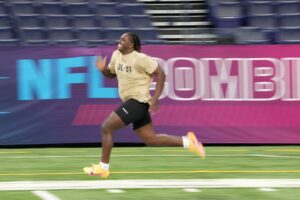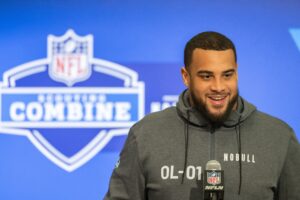After an embarrassing season-ending loss to the Cincinnati Bengals, the Cleveland Browns fired head coach Freddie Kitchens after one year. Kitchens left the team with no choice; his team regressed as the season went on, and Kitchens wasn’t learning from his mistakes. It was a risk making him head coach in the first place, and it certainly didn’t pay off. What went wrong for Kitchens, and what can Cleveland learn from this debacle?
Browns: What Went Wrong in Cleveland for Freddie Kitchens
In order to answer those questions, we must first revisit the circumstances that led to Kitchens’ hiring in the first place. He began the 2018 season as the Browns running backs coach, under offensive coordinator Todd Haley and head coach Hue Jackson. After eight games, Jackson and Haley were fired, defensive coordinator Gregg Williams took over as interim head coach, and Kitchens stepped into the offensive coordinator role. What ensued was a dramatic turnaround for the Cleveland offense, as Kitchens helped quarterback Baker Mayfield break the rookie passing touchdown record despite starting only 14 games.
Williams left after the season, so the Browns needed a new head coach. Their search didn’t end up being very broad, and Kitchens, despite never being a head coach at any level, and having eight games of coordinator experience, earned the job.
Cleveland certainly knew that the team would endure significant growing pains under Kitchens, given his lack of experience. But the thinking was that those pains would be worth it in order to keep Kitchens around long-term, as he grew into the role. Given how great the offense performed under him, along with his relationship with Mayfield, at that point, the Browns couldn’t afford to lose Kitchens. Had they hired a different coach and simply kept Kitchens as coordinator, in the event the offense performed well again, he’d most likely be a head coach somewhere else within two years.
In hindsight, hiring Bruce Arians as head coach may have been a smart move. He and Kitchens worked together in Arizona and have a good relationship. Arians’ interest in the Cleveland job has been well documented. Ideally, Arians would have been able to serve as a close mentor to Kitchens, showing him how to be a head coach while creating a culture and implementing an organizational structure, which Kitchens would then inherit three or four years down the road.
But that’s not what happened. Instead, Kitchens was thrown to the wolves, given the responsibility of leading a Browns team with the most expectations since the team returned in 1999. And right out of the gate, he failed. Cleveland was punched in the mouth by the Tennessee Titans 43-13 in the season-opener, setting the tone for the rest of the year. The Browns finished 6-10, a far cry from the playoff aspirations they had for themselves.
A Complete Failure
It wasn’t just the disappointing record that did Kitchens in. It was how the team performed and progressed, or rather, how they didn’t. As soon as the Browns began the regular season, it was clear that Kitchens was in over his head. His use of timeouts and challenges was abysmal. His situational playcalling was horrible. The offense never seemed to be in sync. Calls were made late in the play clock, causing many delay of game penalties and robbing Mayfield of the ability to perform pre-snap reads and checks at the line. Players were constantly out of position, receivers ran the wrong routes, everything felt rushed and disorganized.
Cleveland has had some bad head coaches over the past 20 years, but it’s hard to remember someone making as many mind-numbing decisions as Kitchens. From a 4th-and-9 draw late in the 4th against the Rams, to attempting to score twice with under two minutes in the half against Seattle (the Browns didn’t score at all in that timeframe), to lining up to punt, then taking a delay of game penalty only to then go for it on 4th down against New England, Kitchens kept fans scratching their heads.
A major selling point for Kitchens was continuity. It’s important for young quarterbacks to remain in the same system to aid their development. So keeping Mayfield and Kitchens together should have meant big things in year two, especially with the addition of Odell Beckham Jr.
That’s not at all what happened. Mayfield regressed in basically every facet of the position. His accuracy was nowhere close to where it was in 2018. He was paranoid in the pocket and bailed from pressure that wasn’t there. He struggled to get the ball to Beckham; ignoring him when he was open and forcing the ball to him when he wasn’t. Mayfield ended up throwing 22 touchdowns and 21 interceptions, which is completely unacceptable. His decision-making was terrible. He looked nothing like the budding star from last season.
The running game also struggled. That seems odd to say since Nick Chubb finished second in the NFL with 1,494 yards. But he did that in spite of an atrocious run-blocking offensive line and Kitchens’ refusal to lean on him consistently. For example, Chubb carried the ball 27 times in Cleveland’s Week 11 victory over the Pittsburgh Steelers. Then, in two games against the Cincinnati Bengals, who were the worst defensive team against the run in 2019, Chubb got 28 total carries.
Ultimately, Freddie Kitchens failed to practice what he preached. Throughout the offseason, he talked about being tough, physical, and disciplined. Yet right away, his team was unprepared. They were embarrassed by the Titans to start the year, then got shelled by the San Francisco 49ers on Monday Night Football, 31-3. The Browns finished with the fourth-most penalties in the NFL. They were also among the league leaders in personal fouls and ejections. Greg Robinson kicked a Titans player in the head in Week 1. Myles Garrett was suspended indefinitely for striking Steelers quarterback Mason Rudolph with a helmet.
It seemed like every week there was a player being disciplined. Damarious Randall sat out multiple games, as did Rashard Higgins and David Njoku, in addition to being injured. Sideline blowups were not uncommon. Frustration permeated the entire team. Even when they were winning, it felt like they lost. Case in point; Pittsburgh and Cincinnati.
Moving Forward Without Freddie Kitchens
To summarize, Kitchens either wasn’t ready to be an NFL head coach, just isn’t cut out to be an NFL head coach, or both. Whatever the case, it didn’t work in Cleveland. And now, as the team prepares to hire yet another coaching staff, general manager John Dorsey, the city’s darling just six months ago, was also fired. He is the one who constructed this roster that didn’t gel. He is the one who hired this dumpster fire of a staff. And now he won’t get a chance to make up for his mistakes.
The Browns can’t afford to make another mistake at head coach. Kitchens’ drowning in the responsibility of the job may cause Cleveland to shy away from another first-time HC. But no matter who the next coach is, he must be able to handle the day to day responsibilities of a head coach, while demanding respect and discipline from his players. That wasn’t Freddie Kitchens. It has to be the next coach, otherwise, the Browns will be rebuilding yet again.
Main photo:
Embed from Getty Images






